The quest for healthy, radiant skin is often navigated through an array of skincare products. However, the foundation of skin health extends beyond the surface, deeply rooted in the nutrients we consume. This article delves into the profound connection between nutrition and skin health, underscoring the pivotal role that vitamins, minerals, amino acids, fatty acids, peptides, and certain diets play in maintaining and enhancing the skin’s integrity and appearance.
Skin, the largest organ of the body, is a reflection of our overall health and is remarkably responsive to the nourishment it receives. It’s not just about what we apply topically; what we eat significantly influences skin hydration, elasticity, and its ability to combat signs of aging and environmental damage. From the vitamins that shield our skin from harmful ultraviolet rays to the essential fatty acids that keep our skin supple and moisturized, the road to radiant skin is paved with the nutrients we ingest.
This comprehensive guide will explore the specific nutrients vital for skin health, including their sources and the roles they play. We’ll look at how a balanced diet, incorporating certain herbs and specific dietary patterns, can contribute to the health and vitality of your skin. Whether you’re battling specific skin issues or striving for an overall glowing complexion, understanding the synergy between nutrition and skin health is a crucial step in achieving your skincare goals.

Vitamins play a crucial role in maintaining skin health, each contributing in unique ways to its appearance, repair, and overall resilience. In this section, we delve into three key vitamins that are essential for healthy skin: Vitamin A, Vitamin C, and Vitamin E. We’ll explore their specific roles and identify food sources where they can be abundantly found.
Vitamin A
- Role in Skin Health: Vitamin A is vital for skin repair and maintenance. It helps in the production of new skin cells, keeping the skin firm and healthy. It’s also essential for wound healing and combating acne.
- Food Sources: Rich sources of Vitamin A include carrots, sweet potatoes, and dark leafy greens like spinach and kale. Animal products like liver, fish, and dairy products are also excellent sources.
Vitamin C
- Importance for Skin: Known for its powerful antioxidant properties, Vitamin C is instrumental in collagen synthesis, which is crucial for skin elasticity and firmness. It also helps in protecting the skin from UV damage and aids in the healing of blemishes and skin discoloration.
- Food Sources: Citrus fruits like oranges and lemons, strawberries, bell peppers, and kiwi are packed with Vitamin C. Other sources include broccoli, Brussels sprouts, and guava.
Vitamin E
- Skin Protection Benefits: Vitamin E is a potent antioxidant that protects the skin from oxidative stress and damage caused by free radicals and UV rays. It’s also known for its moisturizing properties, making it beneficial for dry and irritated skin.
- Food Sources: Nuts and seeds, particularly almonds, sunflower seeds, and hazelnuts, are excellent sources of Vitamin E. Green leafy vegetables like spinach and Swiss chard, as well as plant oils like sunflower and safflower oil, also contain high levels of this vitamin.
Each of these vitamins not only supports skin health but also works synergistically with other nutrients to enhance overall skin appearance and function. Including a variety of these vitamin-rich foods in your diet can significantly contribute to a radiant, youthful complexion.

While vitamins often steal the spotlight in discussions about skin health, minerals play an equally important role. In this section, we focus on two key minerals that are critical for maintaining healthy skin: Zinc and Selenium. These minerals not only support the skin’s integrity but also aid in its healing and protection.
Zinc
- Role in Skin Health: Zinc is a powerhouse when it comes to skin health. It is involved in the maintenance and functioning of the oil glands, helping to repair skin damage and keep the skin soft and supple. Zinc also plays a crucial role in wound healing and can be beneficial in treating acne due to its anti-inflammatory properties.
- Food Sources: Zinc can be found in a variety of foods. Good sources include pumpkin seeds, lentils, chickpeas, and oysters. Meat, especially red meat, is also a rich source of zinc.
Selenium
- Benefits for Skin Protection: Selenium is an essential mineral that works as an antioxidant to protect the skin from environmental damage. It helps in the prevention of cell damage and aging, and it’s known for its ability to aid in the preservation of skin elasticity.
- Food Sources: Brazil nuts are among the richest sources of selenium. Other sources include seafood like shrimp and sardines, as well as mushrooms, whole grains, and seeds.
Incorporating these minerals into your diet is not only beneficial for your skin but also for your overall health. Both zinc and selenium are involved in numerous body functions, and their presence in a balanced diet can contribute significantly to maintaining a healthy, glowing complexion.
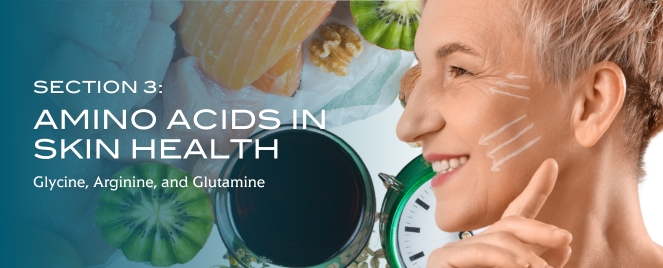
Amino acids play a critical role in maintaining skin health, with particular emphasis on glycine, arginine, and glutamine. These amino acids not only support collagen production but also aid in the production of Human Growth Hormone (HGH), which is essential for healthy skin cell regeneration. This section will explore the importance of these amino acids for skin health and their dietary sources.
Glycine
- Role in Collagen and Skin Health: Glycine, a key component of collagen, contributes significantly to skin elasticity and firmness. It aids in repairing damaged skin tissues, making it essential for wound healing and maintaining youthful skin.
- Dietary Sources: Glycine-rich foods include bone broth, poultry skin, gelatin, and fish. Plant sources include spinach, kale, and beans.
Arginine
- Supporting HGH Production: Arginine is known to stimulate the release of HGH, which is vital for skin cell regeneration and repair. It also plays a role in wound healing and may help to improve skin elasticity.
- Food Sources: Rich sources of arginine include turkey, chicken, pumpkin seeds, soybeans, peanuts, and dairy products.
Glutamine
- Role in Skin Health: Glutamine is another amino acid that supports the production of HGH, contributing to the health and vitality of the skin. It helps in maintaining the hydration and integrity of the skin barrier, which is crucial for a healthy complexion.
- Dietary Sources: Glutamine can be found in beef, chicken, fish, eggs, dairy products, and cabbage. For vegetarians, beans and spinach are good sources.
Ensuring an adequate intake of these amino acids – glycine, arginine, and glutamine – is essential for supporting skin health. They contribute to the maintenance of skin elasticity, aid in skin repair, and support overall skin vitality through their role in collagen synthesis and HGH production. A balanced diet including these amino acids can help in achieving a healthier, more youthful skin appearance.
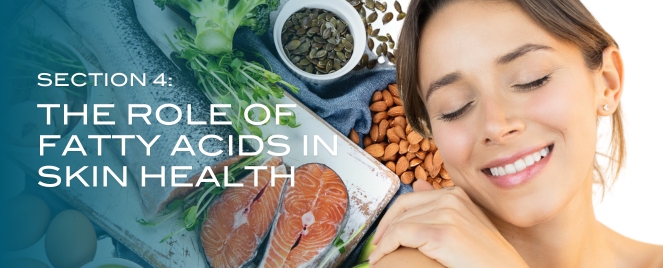
Fatty acids, particularly omega-3 and omega-6 fatty acids, play a significant role in maintaining skin health. They contribute to the skin’s lipid barrier, which is crucial in keeping the skin hydrated and protected from environmental stressors. In this section, we will explore how these fatty acids benefit the skin and where to find them in our diet.
Omega-3 Fatty Acids
- Benefits for Skin: Omega-3 fatty acids are known for their anti-inflammatory properties, which can help in reducing redness and acne. They also play a role in maintaining the skin’s moisture barrier, preventing dryness and promoting a smooth, elastic texture.
- Food Sources: The best sources of omega-3s are fatty fish like salmon, mackerel, and sardines. Plant-based sources include flaxseeds, chia seeds, and walnuts. For those who prefer supplements, fish oil capsules are an alternative.
Omega-6 Fatty Acids
- Importance in Skin Health: While omega-6 fatty acids are more abundant in the diet than omega-3s, they are equally important for skin health. They support skin structure and function and are especially crucial for individuals with dry or sensitive skin.
- Food Sources: Common sources of omega-6 fatty acids include vegetable oils (such as sunflower, safflower, and soybean oil), nuts, and seeds. Poultry and eggs also provide omega-6 fatty acids.
It’s important to maintain a balance between omega-3 and omega-6 fatty acids in the diet, as an imbalance can lead to skin issues and other health problems. A diet rich in omega-3s and balanced in omega-6s is ideal for promoting healthy, glowing skin.
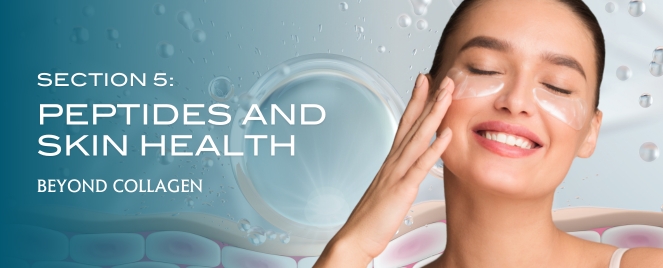
Peptides, short chains of amino acids, are key players in skin health, going beyond just collagen synthesis. They play diverse roles, from healing to rejuvenating skin. In this revised section, we will explore not only collagen-related peptides but also delve into specific peptides like BPC 157, TB 500, and GHK-Cu, examining their unique contributions to skin health and how they can be incorporated into a skincare routine.
Collagen Peptides
- Role in Skin Health: Collagen peptides are fundamental in maintaining the skin’s elasticity and firmness. They help in reducing wrinkles and dryness by promoting collagen production.
- Dietary Sources: These peptides are found in foods rich in collagen, like bone broth, fish, and chicken skin. Collagen supplements, available as powders or capsules, are also a popular choice.
BPC 157
- Benefits for Skin: BPC 157, a peptide with regenerative properties, is known for its ability to accelerate wound healing and reduce inflammation. It may also improve skin elasticity and hydration.
- Sources and Application: While primarily available in supplement form, ongoing research is exploring its use in topical skincare formulations.
TB 500
- Skin Health and Healing: TB 500 is recognized for its healing properties, particularly in tissue repair and regeneration. It can potentially aid in reducing inflammation and improving skin tone and texture.
- Usage: TB 500 is typically used in supplement form, and research into its topical application for skin health is evolving.
GHK-Cu
- Role in Skin Rejuvenation: GHK-Cu, a copper peptide, is celebrated for its anti-aging properties. It helps to firm the skin, enhance elasticity, and diminish fine lines and wrinkles.
- Sources: GHK-Cu is predominantly found in skincare products like serums and creams, where it’s applied topically for maximum benefit.
Incorporating these peptides into a skincare routine, whether through dietary supplements or topical products, can offer comprehensive benefits for skin health. Each peptide brings unique properties, from enhancing collagen production to aiding in skin repair and rejuvenation, making them valuable components in the pursuit of healthy and youthful skin.
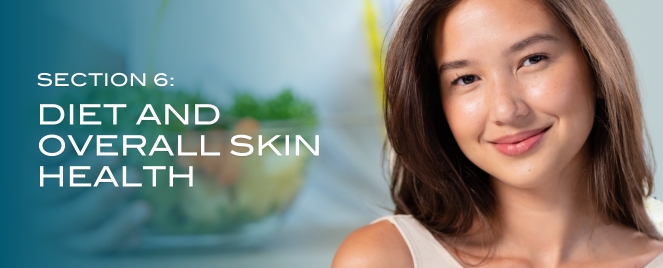
The Mediterranean Diet
- Overview and Benefits: The Mediterranean diet, rich in fruits, vegetables, whole grains, olive oil, and lean proteins, particularly fish, is renowned for its skin health benefits. This diet is high in antioxidants and healthy fats, which aid in reducing inflammation and promoting skin hydration.
- Key Components: Include plenty of leafy greens, nuts, seeds, and fruits like berries and pomegranates. Olive oil and fatty fish provide healthy fats, while whole grains offer essential vitamins and minerals.
Hydration
- Importance for Skin: Adequate hydration is essential for maintaining skin moisture and elasticity. Water helps to flush out toxins from the body, which can improve skin clarity and reduce puffiness.
- Tips for Staying Hydrated: Aim for at least 8 glasses of water per day. Incorporating water-rich foods like cucumbers, watermelon, and oranges can also contribute to hydration.
Avoiding Processed Foods
- Impact on Skin Health: High sugar and processed foods can trigger inflammation and oxidative stress, leading to skin issues like acne, premature aging, and a dull complexion.
- Dietary Adjustments: Reducing intake of sugary snacks, processed meats, and refined grains can improve skin health. Opt for whole, unprocessed foods as much as possible.
Supplementing with Probiotics
- Role in Skin Health: Probiotics can improve gut health, which is linked to clearer, healthier skin. They help in reducing inflammation and can be beneficial for skin conditions like eczema and acne.
- Sources: Include fermented foods like yogurt, kefir, sauerkraut, and kombucha in your diet, or consider a probiotic supplement.
A holistic approach to diet is key for maintaining optimal skin health. By focusing on nutrient-rich foods, staying hydrated, and avoiding processed foods, you can nourish your skin from the inside out.
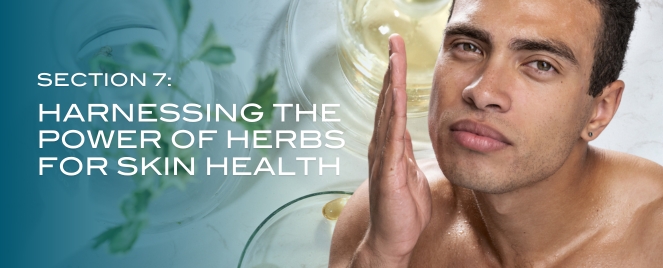
Herbs have long been celebrated for their therapeutic properties, with several playing a pivotal role in enhancing skin health. This section will focus on the benefits of Rosemary, Green Tea, Turmeric, and Grape Seed, delving into how each of these herbs can contribute to a healthier, more radiant complexion.
Rosemary
- Skin Benefits: Rosemary is known for its anti-inflammatory and antioxidant properties. It can help protect the skin from sun damage and free radicals, and improve circulation, which in turn promotes a healthy glow.
- Usage: Incorporate rosemary into your diet by seasoning dishes or drinking rosemary tea. Rosemary oil can also be used in skincare routines, either diluted in a carrier oil or as part of a moisturizing cream.
Green Tea
- Antioxidant Rich: Packed with polyphenols, green tea is excellent for reducing inflammation and protecting the skin against environmental stressors. It’s especially beneficial for reducing the appearance of wrinkles and enhancing skin elasticity.
- Application: Regular consumption of green tea can impart skin benefits. Topically, green tea extract in skincare products helps soothe and protect the skin.
Turmeric
- Anti-Inflammatory and Healing: Turmeric, with its active ingredient curcumin, is highly effective in reducing inflammation, brightening skin, and evening out skin tone. It’s particularly good for acne-prone skin.
- Dietary and Topical Use: Add turmeric to your diet in curries, teas, or smoothies. For topical application, a turmeric face mask can be beneficial for reducing scars and inflammation.
Grape Seed
- Skin Protection and Anti-Aging: Grape seed is rich in antioxidants, particularly proanthocyanidins, which are believed to be even more powerful than vitamins C and E. These antioxidants help in protecting the skin from UV damage and improve skin texture, making it a great anti-aging agent.
- Incorporation in Diet and Skincare: Grape seed oil can be used in cooking or as a salad dressing. It’s also used in many skincare products for its moisturizing and healing properties.
Integrating these herbs into your diet and skincare routine can provide a natural boost to your skin health. Each offers unique benefits, from protective antioxidants to anti-inflammatory agents, helping to maintain a youthful and vibrant skin complexion.
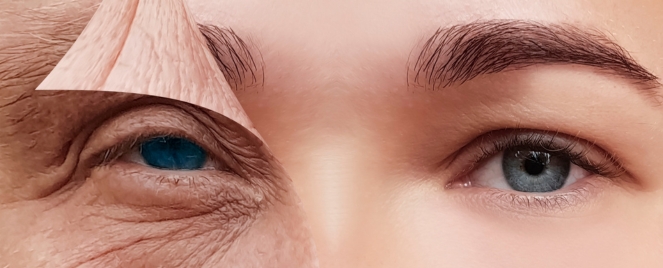
The journey to achieving and maintaining healthy skin is an intricate blend of topical skincare and, importantly, nutritional care. Through this comprehensive guide, we’ve explored the pivotal roles that various vitamins, minerals, amino acids, fatty acids, and specific peptides play in skin health. We’ve also delved into how dietary patterns, hydration, and the inclusion of beneficial herbs can significantly impact the health and appearance of our skin.
Key takeaways include the importance of a balanced diet rich in vitamins A, C, E, minerals like zinc and selenium, and omega fatty acids, which collectively contribute to skin hydration, elasticity, and protection against environmental damage. Amino acids, both from dietary sources and in the form of supplements, are fundamental for collagen production and overall skin repair. The exploration of specific peptides like BPC 157, TB 500, and GHK-Cu has provided insights into advanced options for skin rejuvenation and healing.
Additionally, adopting dietary patterns such as the Mediterranean diet, ensuring adequate hydration, and minimizing the intake of processed foods can enhance skin health from the inside out. The incorporation of herbs like Rosemary, Green Tea, Turmeric, and Grape Seed, each with their unique skin benefits, underscores the potential of natural ingredients in supporting skin health.
Ultimately, this guide emphasizes that beautiful skin is not just about external applications but is deeply influenced by what we feed our bodies. A holistic approach, combining a nutritious diet, adequate hydration, and mindful incorporation of beneficial supplements and herbs, can pave the way towards a radiant, healthy complexion. Remember, the secret to vibrant skin lies as much in our kitchens and diets as it does in our skincare routines.
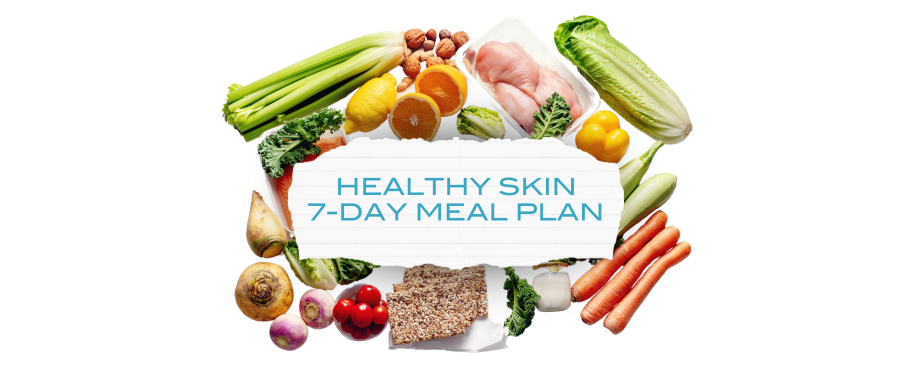
Day 1
- Breakfast: Greek yogurt with mixed berries (blueberries, strawberries) and a sprinkle of chia seeds.
- Lunch: Spinach salad with grilled salmon, avocado, cherry tomatoes, and a vinaigrette dressing.
- Dinner: Baked chicken breast with steamed broccoli and quinoa.
- Snack: Carrot sticks with hummus.
Day 2
- Breakfast: Smoothie with spinach, banana, almond milk, and a scoop of protein powder.
- Lunch: Turkey and avocado wrap with whole-grain tortilla, lettuce, and tomato.
- Dinner: Grilled shrimp with mixed bell peppers and brown rice.
- Snack: A handful of almonds.
Day 3
- Breakfast: Oatmeal topped with sliced almonds and fresh peaches.
- Lunch: Lentil soup with a side of mixed greens salad.
- Dinner: Stir-fried tofu with mixed vegetables (carrots, snow peas, bell peppers) and a side of jasmine rice.
- Snack: Greek yogurt with a drizzle of honey.
Day 4
- Breakfast: Scrambled eggs with spinach and mushrooms, and a slice of whole-grain toast.
- Lunch: Quinoa and black bean salad with corn, tomatoes, and a lime-cilantro dressing.
- Dinner: Baked cod with a side of asparagus and sweet potato.
- Snack: Sliced cucumber and cherry tomatoes.
Day 5
- Breakfast: Whole grain pancakes topped with fresh berries and a dollop of Greek yogurt.
- Lunch: Chicken Caesar salad with romaine lettuce, Parmesan cheese, and whole-grain croutons.
- Dinner: Beef stir-fry with broccoli, carrots, and bell peppers, served with brown rice.
- Snack: An apple with peanut butter.
Day 6
- Breakfast: Avocado toast on whole-grain bread with a side of mixed fruit.
- Lunch: Tuna salad with mixed greens, cucumber, and olives.
- Dinner: Grilled lamb chops with roasted Brussels sprouts and a quinoa pilaf.
- Snack: A banana.
Day 7
- Breakfast: Berry and spinach smoothie with flaxseeds.
- Lunch: Roasted vegetable and feta cheese wrap.
- Dinner: Baked salmon with a side of sautéed kale and mashed cauliflower.
- Snack: A handful of mixed nuts.
Note: Remember to drink plenty of water throughout the day to stay hydrated, as hydration is key for healthy skin.
